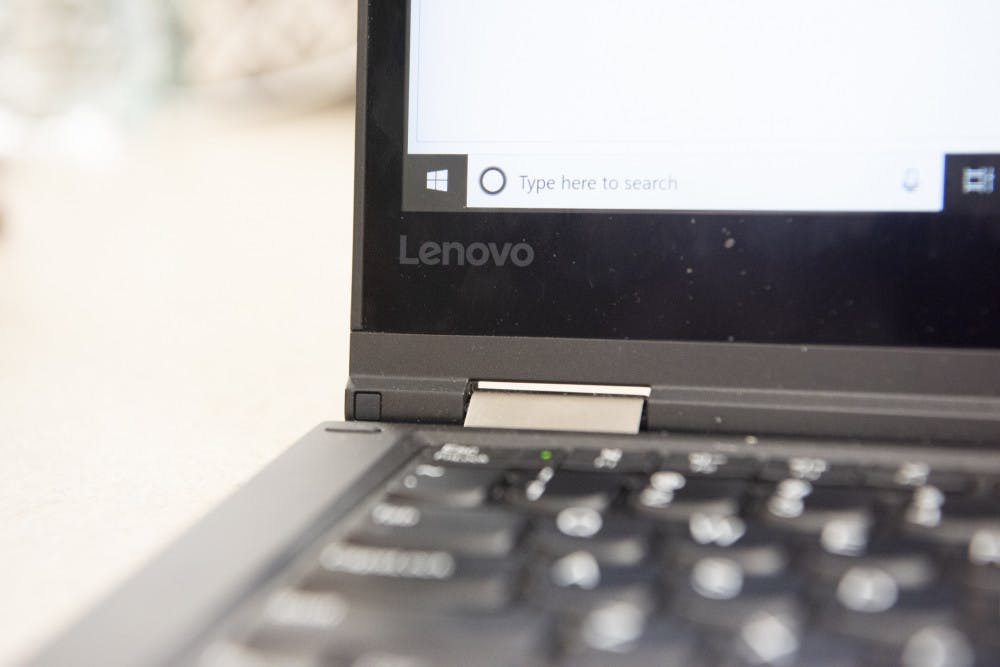Seton Hall provides Lenovo laptops with updated software and classroom tools to all students and faculty. Incorporated into each student’s bill under “Mobile Computing” is a fee for the laptops.
[caption id="attachment_24387" align="alignnone" width="838"] Sarah Yenesel/ Photography Editor[/caption]
The University considers the mobile computing program as their own version of ubiquitous computing.
According to the SHU website, “Ubiquitous Computing refers to programs aimed at making a computer available to every member of a learning community so that everyone in that community is able to communicate and access learning materials ‘any time, any place.’”
Paul Fisher, the associate chief information officer and director of the Teaching, Learning and Technology Center (TLTC), explained the four main reasons as to why the Mobile Computing Program exists.
“First, to be able to provide the best possible technology at the most affordable price is an important concern at the University,” Fisher said.
The second reason is that the program allows the faculty to plan a curriculum with tested software and useful tools like Blackboard, Okta and WebAssign to complete assignments. Fisher said this links to the third reason, the ability to stock parts and spare laptops, which helps provide repair for laptops and the ability to utilize loan ones.
“This facet of the program helps to reduce the reliance on computer labs on the campus, freeing up space for other academic programming and stops the students from scurrying off to Best Buy or Staples to drop off their computer for repair,” Fisher said.
Fisher said that the fourth reason is “to ensure that all students have equal access to the same technology regardless of their socio-economic status, leveling the playing field for all students and bridging the digital divide.”
Phoebe Hall, a sophomore religion major, shared her thoughts on the SHU laptops. “I think that the laptops are useful and it is good to have consistency with the option for everyone,” Hall said. “The laptops, though, have a lot of issues, require constant updates and are physically fragile.”
Students have said they appreciate the goal behind the program, but wish for better quality laptops.
Audrey Eugenia, a junior diplomacy major, said she firmly believes that the laptops need updating. “I definitely think that for the amount that we are paying for the laptops, they should give us more recent models that are more fit for modern times,” Eugenia said.
Fisher explained the University’s choice of computer brand. “Lenovo has been the choice each time, except for once in 2012, because they ultimately offer the latest technology and the best service package for the price,” Fisher said. “There is currently a task force that is assessing this program and that committee may make recommendations to change the program as necessary.”
Werdeh Hassan can be reached at werdeh.hassan@student.shu.edu.
Sarah Yenesel/ Photography Editor[/caption]
The University considers the mobile computing program as their own version of ubiquitous computing.
According to the SHU website, “Ubiquitous Computing refers to programs aimed at making a computer available to every member of a learning community so that everyone in that community is able to communicate and access learning materials ‘any time, any place.’”
Paul Fisher, the associate chief information officer and director of the Teaching, Learning and Technology Center (TLTC), explained the four main reasons as to why the Mobile Computing Program exists.
“First, to be able to provide the best possible technology at the most affordable price is an important concern at the University,” Fisher said.
The second reason is that the program allows the faculty to plan a curriculum with tested software and useful tools like Blackboard, Okta and WebAssign to complete assignments. Fisher said this links to the third reason, the ability to stock parts and spare laptops, which helps provide repair for laptops and the ability to utilize loan ones.
“This facet of the program helps to reduce the reliance on computer labs on the campus, freeing up space for other academic programming and stops the students from scurrying off to Best Buy or Staples to drop off their computer for repair,” Fisher said.
Fisher said that the fourth reason is “to ensure that all students have equal access to the same technology regardless of their socio-economic status, leveling the playing field for all students and bridging the digital divide.”
Phoebe Hall, a sophomore religion major, shared her thoughts on the SHU laptops. “I think that the laptops are useful and it is good to have consistency with the option for everyone,” Hall said. “The laptops, though, have a lot of issues, require constant updates and are physically fragile.”
Students have said they appreciate the goal behind the program, but wish for better quality laptops.
Audrey Eugenia, a junior diplomacy major, said she firmly believes that the laptops need updating. “I definitely think that for the amount that we are paying for the laptops, they should give us more recent models that are more fit for modern times,” Eugenia said.
Fisher explained the University’s choice of computer brand. “Lenovo has been the choice each time, except for once in 2012, because they ultimately offer the latest technology and the best service package for the price,” Fisher said. “There is currently a task force that is assessing this program and that committee may make recommendations to change the program as necessary.”
Werdeh Hassan can be reached at werdeh.hassan@student.shu.edu.

Comments




